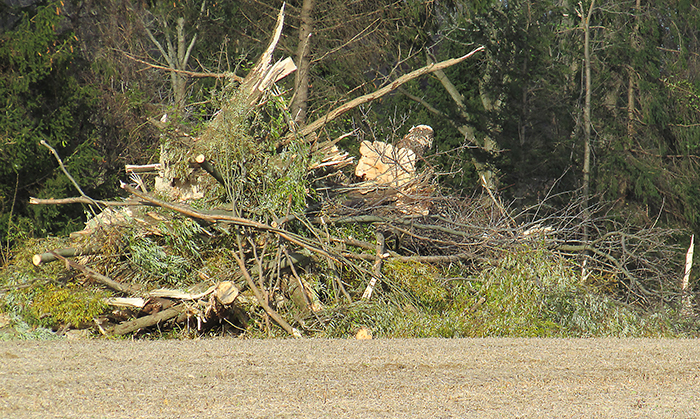
By Pam Wright
Local Journalism Initiative Reporter
Chatham-Kent’s temporary tree-cutting bylaw is no more.
In a narrow 9-8 vote, council approved a motion from East Kent Coun. Steve Pinsonneault to get rid of the woodlot protection adopted by the municipality two-and-a-half years ago that prohibits the clear cutting of woodlots.
The decision was made in front of a packed council chamber Sept. 25 – with 17 deputations presented to council from citizens and groups on both sides of the issue.
A motion from Wallaceburg Coun. Aaron Hall to keep the temporary bylaw in place until further work could be done by the Natural Heritage Committee of the Whole, was withdrawn by Hall after Pinsonneault’s motion got the green light.
The elimination of the bylaw will see the municipality return to the Natural Heritage Strategy approach that has been in place from 2014 until 2021 when the temporary bylaw came into play.
Prior to the vote, Pinsonneault reaffirmed his position, stating the issue has been passed on by three terms of Chatham-Kent council.
“Ninety-nine per cent of farmers are good stewards of the land and they’ve been good stewards of the land on some farms for several generations,” Pinsonneault told council. “Personally, I’d like to see incentives put up for woodlots. I think that could help us, somewhat, in this dilemma that we seem to face so regularly.”
Pinsonneault said the NHS needs to be enhanced, not just reinstated, noting he doesn’t think more input is needed as both sides haven’t changed their position.
Other councillors concurred.
South Kent Coun. Trevor Thompson, who seconded the motion, said more work needs to be done around tree protection, but said it shouldn’t be done in a way that “puts pressure on one in support of another.”
“We do need to recognize there’s a vested interest on both sides,” he said. “Both sides are very entrenched.”
In support of removing the bylaw, South Kent Coun. Ryan Doyle said “everyone but farmers” are allowed to take down trees.”
Doyle said he’s spoken with multiple farmers who said that, in the past, if it weren’t for the threat of a bylaw that would have stopped them from taking down trees, there wouldn’t have been so much clear cutting. He said he was also told by farmers they would not plant trees on their land, as they wouldn’t be able to cut them down.
All of the speakers spoke strongly on their position. Those who wanted to keep the temporary bylaw until a permanent solution could be found emphasized the loss of biodiversity and natural habitat. Some – including a number of farmers – called for tax breaks and incentives to encourage the conservation of woodlots.
East Kent farmer Olaf Natvik, who has 50 acres of woodlot on his 125-acre farm, told council the last remaining woodlots need protection, especially when large corporations purchase farms with the intention of clear-cutting the land.
Natvik said many people would “roll in their graves” if they knew what happened to their woodlots.
In her remarks to council, environmental activist Sally Joyce stated it’s difficult to maintain human health without protecting forest cover and mature trees.
“In nature everything is connected to everything else,” Joyce said. “If we continue to give priority to cash crops over woodlots, the tipping point will come when soils completely die and crops fail because our local biodiversity ecosystems have imploded because of our destructive actions. A local tree-protection bylaw is well overdue.”
But those on the agriculture side said property owners should be able to do as they wish with their land, stressing Chatham-Kent needs more productive farmland to grow food.
Kent Federation of Agriculture president Brad Snobelen said rural landowners have been waiting for a resolution to end the temporary bylaw, noting the ministry of agriculture has asked Ontario farmers to increase food production by 30 per cent.
“In order for our farms to remain competitive and profitable, farmers need to be in control of their land,” Snobelen told council. “That’s the message the Kent Federation of Agriculture is hearing from our more than 1,850 members.”
Snobelen said the Natural Heritage Strategy was successful in the past and generated positive results.
In his deputation, long-time agriculturalist Bill Parks, said Ontario is losing more than 319 acres of farmland every day to urban development and the province needs more farmland not less.
Parks said Chatham-Kent’s tree cutting bylaw is “counterproductive” to increasing the farmland necessary to meet the Ministry of Agriculture’s 2032 goal of increasing food production by 30 per cent, adding the Natural Heritage Strategy is adequate.
He called on council to defeat the bylaw.
Prior to the vote, Hall, chair of the natural heritage committee, said his motion would start “a clear path forward for the natural heritage work.
“I think it’s very essential for our council to be diligent and show leadership to all of our residents in our community,” he said, noting history has shown that having the conversations about woodlots without regulations “puts our natural heritage at risk, opening up the door for irrepable damage to occur.”
According to an administrative report, tree cover dropped from just under four per cent in 2010 to 3.54 per cent in 2020.






